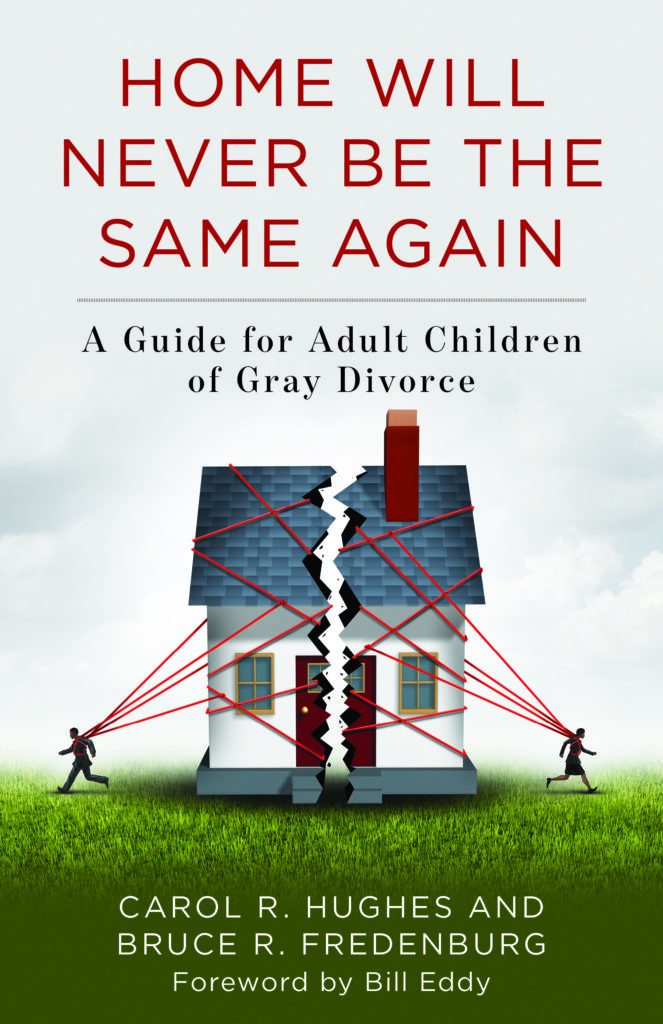
The “Gray Divorce” (people over 50 divorcing) has become so common that it has begun to draw much attention.
Unfortunately, there is one group of people who are affected by the gray divorce that has not gotten attention. The Adult Children of Divorce have long been the silent sufferers when their parents divorce. There are many books and resources available for divorcing couples with young children, but we have never had a book that addresses the affect divorce has on Adult Children whose parents are divorcing. Friends and relations often say to Adult Children of divorce, “Well, thank goodness your parents waited until you were grown.” As if to say, well, once you are grown, your parents’ divorce doesn’t affect you. How insensitive and misguided such a statement is. As a society we need to understand that Adult Children ARE affected by their parents’ divorce, and we need to realize our society believing that is does not affect them is that those Adult Children of Divorce are alone in the grief and pain of the loss of their family of origin, without support or understanding. They deserve better – they deserve more, and Carol Hughes and Bruce Fredenberg are their advocates for that in this book.
I can tell you, from personal experience, even an adult is adversely affected by his parents’ divorce.
I was about 6 years old when my grandparents divorce. I can remember my father, who, as their only child, had to bear the full burden of being the counselor and go-between for his middle-aged parents as they navigated the uncharted waters of divorce. He was angry and impatient with both of them. And because it was the mid 1960’s, I think he was embarrassed because divorce was still something good people “just didn’t do.” He was so busy tending to them that he never allowed himself to grieve the loss of his family, but I know he felt that. I am quite sure that experience is what ultimately brought me around to being a family lawyer and doing Collaborative Divorce work. Those of us who work as professionals in the Collaborative Divorce community have always known that the splatter from a divorce doesn’t just hit the parties themselves or their minor children… the fall-out from divorce not only affects the couple and their young children but also their friends and extended family, and ESPECIALLY their Adult Children.
Thanks to Carol Hughes and Bruce Fredenberg for finally bringing us the book so many of us who work in this field have yearned for. I believe this will become the seminal work on this subject, long over-due. For professionals in the field, we will now have a resource that will help divorcing couples realize the effect their divorce is having on their adult children and hopefully be better equipped to help their adult children through the process rather than using them as their counselors and mediators. Children, whatever age, do not need to be brought into the details of their parents’ divorce. Divorcing parents should understand that bringing their adult children into too much of the situation will have long-term, adverse effects on them, just like it would on their younger children. Especially when adult children are forced into the parenting role for their divorcing parents, it can put stress on those children that will put their personal and professional relationships at risk.
With “Home Will Never Be the Same Again” we have a book to offer to Adult Children of Divorce to help them understand that all the feelings they have are normal, that they are entitled to feel them and that they should not hesitate to seek out whatever support they need, such as their own counseling, to help them manage this trauma.
After all, that’s what this is, a divorce is a trauma not unlike a death – it is the loss of a relationship. For most people, the family unit in which they grew up was their foundation, their emotional infrastructure, and it stays an important element in people’s lives, even after they are adults and have their own families. To lose the family unit your parents provided causes adults to question everything, and they need their own support for processing this trauma. This book will also be a great resource for divorcing parents to understand what affect their divorce has on their adult children, so hopefully, those gray divorce parents will continue to be the parent and seek support from their own counselors and mediators rather than laying their troubles on their adult children. With the wisdom from this book, divorcing parents can give their children, even their adult children, the gift of allowing them to just be their children. I recommend every parent who is going through a Gray Divorce to purchase this book, read it themselves and give it to their Adult Children. The discussions this book will promote may change all their futures in a very positive way.











